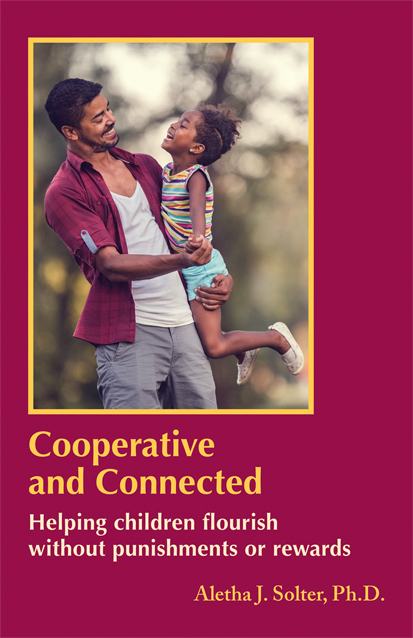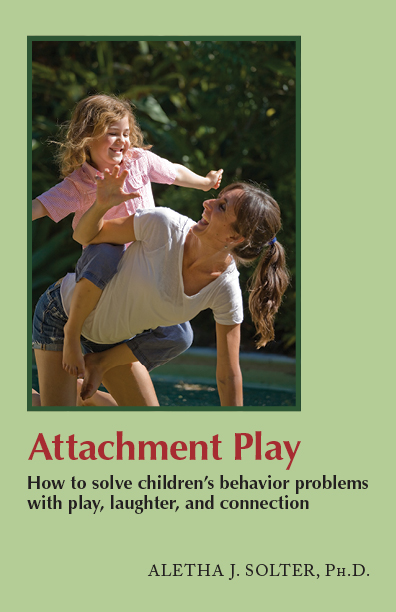An only child is aggressive with other children at school
by Aletha Solter, Ph.D.
Question:
My son is six years old and an only child. We have always taught him to use his words, and that hitting does not solve a problem. Recently his teacher expressed that he was becoming more aggressive towards other children in class. We do not see this at home with us or when he has a friend over. He has always played well with other children. Can you give us some strategies for helping him?
Answer:
Children without siblings sometimes have trouble getting along with other children because they don't have the daily learning experience at home of handling conflicts with their peers. Children with siblings have daily opportunities to learn about sharing, taking turns, and taking other people's needs and feelings into account. You wrote that your son plays nicely with other children at home. I recommend that you invite children from his class to play with him at your home (one at a time), so he can establish individual relationships with them.
However, when children hit or bite other children, it is usually an indication that they are feeling anxious, insecure, or threatened in some way. To change your son's aggressive behavior, you can look for the underlying causes. I suggest that you look for sources of stress in your son's life both at school and at home.
School situation: Is he having some social problems with other children? For example, are they excluding him from their play or teasing him? Has he been hit by other children? Is he having trouble keeping up with the demands of school? Is he feeling pressured to perform beyond his capacities? Is the teacher a harsh disciplinarian? Has there been a substitute teacher? Are the instructional methods a bad "fit" with his particular learning style? Is the school environment overstimulating for him?
I suggest that you talk with your son's teacher to figure out what might be causing him to act aggressively at school. You can also spend some time observing him at school. This will give you first-hand information about the kind of environment he is dealing with there, including the teacher's discipline style.
Consider also talking with your son about this problem. Perhaps he has some insights to share with you about why he hits other children. Maybe it's one particular child who provokes him in some way. Listen to him carefully and non-judgmentally when he talks about what happens at school.
Another way to help him is to engage him in a game about school in which he plays the role of the teacher while you pretend to be a child. Then reverse the roles and let him be a child in your imaginary school. Or you can create a school classroom with stuffed animals. His response to this play might give you some insights into the school environment that he is dealing with. If you make this activity silly and fun, you will also help him release stress through laughter.
Home situation: Sometimes stressful events at home can cause a child to act aggressively at school. Was there a stressful event at home that coincided with the beginning of your son's aggressive behavior (for example, marital problems, loss of a job, illness, mother's pregnancy, death in the family, etc.)? Has there been a change in his life (for example, in his after-school caretaking arrangements)? Has he recently heard about something frightening or seen a frightening or violent video? Have you been spending less time with him than usual? Have you or someone else used harsh discipline with him?
If you suspect that something stressful at home is contributing to your son's behavior, try to find ways to reduce stress or help him cope with it.
Finally, whatever the underlying cause for your son's aggressive behavior, you can help him release stress, anger, and frustration by allowing him to cry at home as much as he needs to. Don't try to stop the flow of tears or angry outbursts. Crying and tantrums are healthy outlets for pent-up emotions. The more your son is able to cry freely at home with your loving attention, the less aggressive he will be.
About Aletha Solter
Aletha Solter, PhD, is a developmental psychologist, international speaker, consultant, and founder of the Aware Parenting Institute. Her books have been translated into many languages, and she is recognized internationally as an expert on attachment, trauma, and non-punitive discipline.
Aware Parenting is a philosophy of child-rearing that has the potential to change the world. Based on cutting-edge research and insights in child development, Aware Parenting questions most traditional assumptions about raising children, and proposes a new approach that can profoundly shift a parent's relationship with his or her child. Parents who follow this approach raise children who are bright, compassionate, competent, nonviolent, and drug free.
For more information about dealing with aggrssive behavior in children, see Aletha Solter's books, Cooperative and Connected and Attachment Play.

